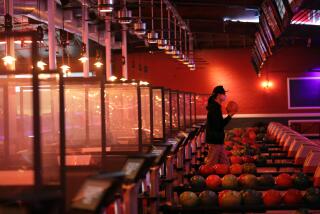Newsom sets new rules for reopening California restaurants, malls and offices amid coronavirus

- Share via
SACRAMENTO — California restaurants and shopping malls can soon reopen in counties that meet state standards for testing and success at reducing cases of the coronavirus, but all businesses will have to abide by state guidelines for physical distancing and cleaning regimens, Gov. Gavin Newsom said Tuesday.
Two months after the governor issued a stay-at-home order that closed most businesses, Newsom said restaurants can reopen for dine-in service in counties certified as meeting state benchmarks for addressing the pandemic, but they should implement changes to guard against spreading the virus.
Shopping centers including strip malls and outlet malls will be allowed to reopen with in-store customers in counties certified to have contained COVID-19, while car washes and pet groomers can also resume operating with safeguards.
The governor also said that Californians who cannot work from home will be allowed to work in offices as long as their counties allow it and the offices undergo modifications to prevent the spread of the virus.
“As we begin these modifications — and we already have reopened 70-plus percent of the economy — as we begin to modify with these dine-in opportunities, let’s make sure we do so cognizant not only of our own health but the health of our most vulnerable and those are our seniors,” Newsom said.
The governor said allowing additional firms to reopen will not work if businesses are not engaging in safe practices.
“None of this means anything if customers don’t feel safe,” Newsom said.
Before businesses can reopen, a county must complete a risk assessment and develop protection plans that include training employees in how to limit the spread of the virus, providing screenings of employees, disinfectant protocols and physical-distancing guidelines.
The state said Tuesday that seven counties — mostly rural — have been certified to have met the state’s conditions for additional businesses to reopen: Amador, Butte, El Dorado, Lassen, Nevada, Placer and Shasta counties.
“There are some unique characteristics in some counties where they are hitting on all cylinders,” Newsom said, adding that additional counties may be able to reopen more businesses later Tuesday.
Talks are underway with 23 other counties on whether they can expand the reopenings, the governor said, but he noted that conditions are still too serious in Los Angeles and San Francisco counties to modify the guidelines for resuming business.
Jot Condie, president and chief executive of the California Restaurant Assn., said, “Restaurants are getting ready now to open their doors and enthusiastically welcome their guests.”
The new rules affect a restaurant industry with more than 90,000 businesses in California, the vast majority operated by independent proprietors. The industry employs 1.4 million food service workers, the California Restaurant Assn. reminded the governor in a recent letter asking for help with taxes and evictions.
“After nearly two months of closure, every restaurant owner in California is reaching a critical phase in their ability to survive,” Condie added Tuesday. “Today’s announcement gives us more clarity on what reopening looks like.”
The new guidelines were released against a backdrop of continued concern by health officials about the number of confirmed coronavirus cases in California, which is nearing 70,000, with more than 2,800 related deaths in the state.
Earlier Tuesday, Dr. Anthony Fauci, the country’s top infectious disease expert, warned Congress that states reopening too quickly could “trigger an outbreak that you may not be able to control.”
The phased reopening of California began Friday when clothing stores, sporting goods retailers, bookstores, music stores, toy stores and florists were allowed to provide customers with curbside service, unless blocked by local restrictions.
At the same time, the state permitted manufacturers, suppliers and logistics services that provide goods to the newly opened retailers to resume operations.
The retail businesses are required to draft a plan to protect customers and employees from becoming infected with the virus, including a method of screening employees to determine if they are sick.
The state plan would allow in-restaurant dining and other businesses to reopen if county health officials can show that the spread of the coronavirus has stabilized in their part of the state.
Counties must have adequate testing and hospital capacity and the ability to trace those who have been in contact with ill people.
Last week, the Newsom administration warned rural counties that were defying the state’s stay-at-home order that they could lose disaster funding if they don’t abide by the state’s restrictions.
Yuba, Sutter and Modoc counties all received warning letters after they relaxed restrictions that had closed gyms, restaurants, shopping malls, hair salons and other businesses.
State Sen. Jim Nielsen (R-Gerber) said Tuesday the governor was right to allow some rural counties to get back to business.
“By following county health guidelines, rural regions can safely reopen [their] businesses,” Nielsen said. “Local economies need to reopen so workers can earn money to pay their rent and mortgage.”
The tension between local businesses and the governor was raised again Tuesday when the conservative Center for American Liberty announced that it is suing Newsom to force the state to allow beauty salons to reopen immediately.
On Friday, Newsom signaled the coming of more formalized guidelines for restaurants, malls and other business this week.
“We have a new checklist that goes through issues around hand-washing, sanitation, how to address the needs of customers through pickups, how we can make the pickup and drop-off process for deliveries, as well as pickups for customers, easier and safer,” Newsom said Friday. “We tried to tailor these guidelines as prescriptive as we can with a frame of flexibility always.”
He said the goal is to encourage businesses to serve customers with innovation.
“That entrepreneurial spirit we also want to see advanced as we work through this next phase,” Newsom said then. “We want to provide the kind of flexibility that we realize is important.”
To prepare for the next phases of reopening, Newsom said Tuesday that testing continues to expand in California.
The state has provided more than 1 million diagnostic polymerase chain reaction tests, and is now exceeding the April goal of 25,000 tests a day, providing tests to an average of 40,000 people daily during the last three days. He said the state is “making progress” toward a goal of testing more than 61,000 per day.
“A million is an important milestone in our efforts, but still not where we need to go,” Newsom said.
Newsom said the state is also adding dozens of testing sites in rural and other underserved areas, as well as planning for roaming tests in those areas, while the state has also given pharmacies authority to begin offering tests.
Times staff writer Emily Baumgaertner contributed to this report.
More to Read
Sign up for Essential California
The most important California stories and recommendations in your inbox every morning.
You may occasionally receive promotional content from the Los Angeles Times.












